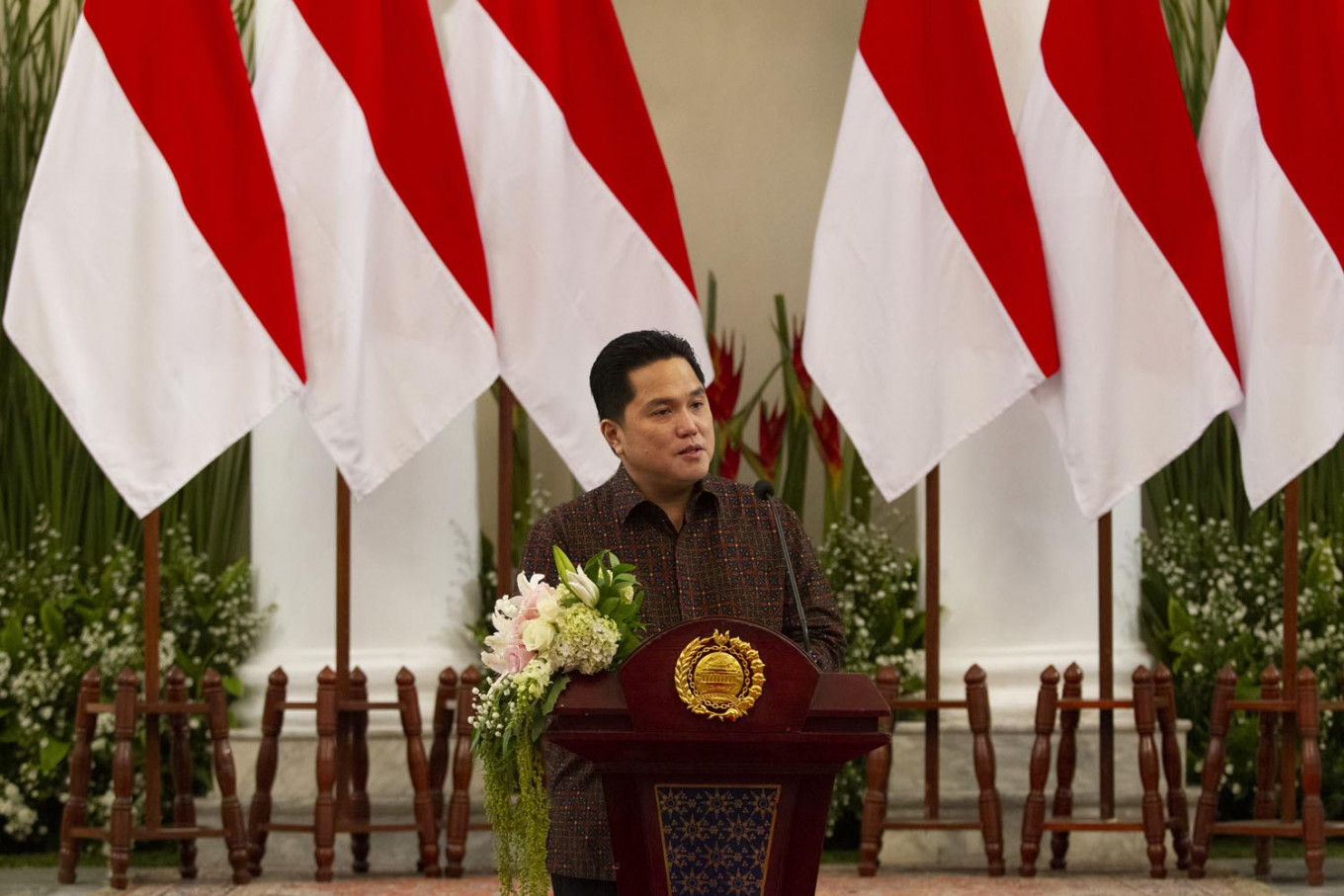Popular Reads
Top Results
Can't find what you're looking for?
View all search resultsPopular Reads
Top Results
Can't find what you're looking for?
View all search resultsSOEs Ministry signals appetite to fund local tech start-ups
The ministry wants to increase national ownership of Indonesian tech start-ups, many of whom have been bagging funds from international investors.
Change text size
Gift Premium Articles
to Anyone
T
he government wants state-owned enterprises (SOEs) to invest more in Indonesian tech start-ups to boost national ownership of tech firms, which have mostly received funding from international investors.
Top SOEs Ministry officials have said over the past two months that the government wants five SOEs, through their respective venture capital (VC) arms, to lead the way, even hinting at the formation of a national VC holding firm.
The five are Bank Mandiri through Mandiri Capital, Bank Rakyat Indonesia (BRI) through BRI Ventures, telco giant Telkom through MDI Ventures, Telkomsel through Telkom Mitra Inovasi (TMI) and Bank Negara Indonesia (BNI) through a yet-to-be-formed VC arm.
BNI has been planning to establish a VC arm since 2019, but faced delays after the ministry restricted the establishment of new subsidiaries through Ministerial Decree No. 315/2019.
“Foreign investors are investing in these start-ups, why aren’t we? We cannot wait around until these companies are big and profitable. If we are scared, then don’t dream of us owning our local start-ups,” said SOEs Ministry spokesperson Arya Sinulingga, an aide to Minister Erick Thohir, on Oct. 5.
He went on to say that the minister was formulating “a way to consolidate” SOE-backed VC firms, so they could focus on funding more companies.
Read also: Indonesia’s venture capital progress hinges on new rules
Minister Erick previously said during an event in Bali on Sept. 19 that he wanted the five SOEs to invest in 50 more start-ups, on top of 57 tech companies that had received funding from the state-backed venture capital firms.
“Many unicorn companies got funding from foreign investors, why is that? The investors are not to blame, because that is our fault,” he said, as reported by Kompas, referring to the lack of local investors.
Indonesian start-ups have enjoyed an influx of capital from big global names such as China's Tencent, American tech behemoth Google and a variety of Singapore-based VC firms over the years. Recently, local e-commerce start-up Ula received funding from the VC firm of Amazon billionaire Jeff Bezos.
According to public relations agency Scale PR, US$3.8 billion in funding was channeled to 104 Indonesian start-ups in the first six months of this year. While the number of start-ups increased 45 percent year-on-year (yoy), the amount of funding increased 91 percent yoy.
Most funding went to fintech, logistics and e-commerce start-ups, including e-commerce company Bukalapak, TaniHub and logistics company SiCepat, all of which are portfolio companies of SOE-backed VC firms.
Corporate venture capital (CVC) funds, such as those owned by SOEs, usually invest in companies that align with their core businesses, such as banks investing in fintech start-ups.
A case in point, MDI Ventures and two other investors recently funded buy-now-pay-later (BNPL) start-up Kredivo through a more than $125 million private investment in public equity (PIPE) scheme, prior to Kredivo’s initial public offering (IPO) plan.
Read also: Credit lender Kredivo to go public via $2.5 billion SPAC merger
However, Arya said state-owned VC firms would expand their options and invest in start-ups that would be “needed by Indonesians” such as agriculture technology (agritech) and education technology (edutech).
Center of Economics and Law Studies (CELIOS) director Bhima Yudhistira said SOEs participation in start-up funding could be an alternative to raising capital from local VCs or an IPO.
“This is important because if these start-ups generate profits, it will go to the foreign investors and this can hurt our balance sheet in the long run,” he told The Jakarta Post in a phone interview on Thursday.
He went on to say that local start-ups would further benefit from possible partnerships with SOEs, such as channeling bank loans through e-wallet platforms.
Meanwhile, SOEs could benefit from adopting start-ups' innovation or business model to improve their operations and advance their competitiveness, Bhima added.
“However, if state-owned companies inject funds into start-ups that still make a loss, that could be regarded as unusual activity by the Supreme Audit Agency [BPK] and it would be detrimental to the state's finances. So SOEs need to be very selective,” he said.










